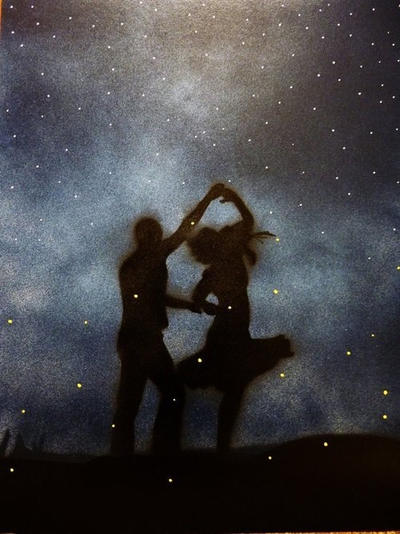
Mars-Saturn Synastry: The Eternal Loop
 Mars contacting Saturn in synastry—whether it’s conjunct, square, or opposite—represents pure passion meeting an immovable force. Many astrologers have issued caution about this aspect, seeing it as a no-entry sign flashing red with the words: Abandon hope, all ye who enter here! But is it really all doom and gloom? Mars is the planet of action, impulse, and drive. Saturn, meanwhile, insists that all things be earned through hard-work and patience. When these two meet in synastry, it can feel frustrating. Mars wants to go full speed, but Saturn says, “Not so fast, young one.” This can manifest as sexual tension that feels like stop-and-go traffic. Fire and ice make steam, but also confusion. There can be an initial surge of attraction followed by a maddening sense of barriers—whether physical, emotional, or psychological. Mars pushes, Saturn resists. One person might feel controlled, the other might feel overwhelmed by their partner’s intensity.
Mars contacting Saturn in synastry—whether it’s conjunct, square, or opposite—represents pure passion meeting an immovable force. Many astrologers have issued caution about this aspect, seeing it as a no-entry sign flashing red with the words: Abandon hope, all ye who enter here! But is it really all doom and gloom? Mars is the planet of action, impulse, and drive. Saturn, meanwhile, insists that all things be earned through hard-work and patience. When these two meet in synastry, it can feel frustrating. Mars wants to go full speed, but Saturn says, “Not so fast, young one.” This can manifest as sexual tension that feels like stop-and-go traffic. Fire and ice make steam, but also confusion. There can be an initial surge of attraction followed by a maddening sense of barriers—whether physical, emotional, or psychological. Mars pushes, Saturn resists. One person might feel controlled, the other might feel overwhelmed by their partner’s intensity.
Mars and Saturn are frenemies who, when tangled up in synastry, create a relationship dynamic that feels like driving with the handbrake on. There’s urgency, there’s desire, Saturn loves to throw a spanner in Mars’ wild, reckless plans. The initial attraction can be magnetic—because opposites fascinate. Mars sees Saturn as a challenge, a fortress to conquer. Saturn, in turn, is both drawn to and wary of Mars’ intensity. There’s something tantalizing about that interplay of control and desire, push and pull. But in time, the frustrations set in. Mars starts to feel stifled, as if every passionate impulse is met with a slow, measured shake of the head. It’s hard-won intimacy, the kind that’s built over time rather than indulged in all at once. Mars learns patience. Saturn learns to let go, just a little. What seems like an obstacle might just be the making of something real. But only if both are willing to do the work. Otherwise, well… Mars will rage, Saturn will retreat, and the love story will end in a slow, smoldering standoff.
Mars-Saturn in synastry is a deep, undeniable pull, one that can create a connection that is both challenging and unbreakable. It’s the love story of endurance, of slow-burning tension that refuses to flicker out. Take Patrick Swayze and Lisa Niemi—he, the passionate, fire-hearted Mars, always in motion, and she, the cool, controlled Saturn, the stillness that both frustrated and fascinated him. If you watch their dynamic, it’s clear: he was always reaching, always pursuing, while she maintained a certain composure, a quiet strength. But this part of the attraction of this aspect—it’s about the irresistible magnetism of difference.
Mars wants, chases, craves. And what is more desirable than something just out of reach? Saturn, with its air of restraint, its cool self-possession, becomes the ultimate prize—something to be won, something worth fighting for. But Saturn is no mere passive object of desire. In the beginning, Saturn enjoys this game, secretly relishing the heat of Mars’ pursuit, feeling an unspoken satisfaction in being the thing Mars cannot easily claim. There is a dance here, one of control and surrender, of patience and urgency. It is tense, but tension is the root of passion.
This is why we see Mars-Saturn in so many deep, long-term relationships. At a purely physical level, it ignites something undeniable—Mars, after all, rules desire, and Saturn provides the necessary friction to make this desire endure rather than burn out too quickly. Where an easy, flowing connection might lead to effortless chemistry that fades, Mars-Saturn lingers. It creates a push-pull dynamic that keeps both people engaged, sometimes frustrated, but always bound by something undeniable. If left unconscious, it can lead to resentment—Mars feeling rejected, Saturn feeling pressured. But if handled well, it creates passion with endurance. It can create legendary love stories precisely because it isn’t easy. When astrologers warn of trouble, they aren’t entirely wrong. This is no effortless, smooth-sailing affair. But where’s the fun in that? The most iconic romances, the ones that last, often have this edge of strife, that interplay of longing and restraint. And isn’t this, in a way, the very essence of attraction?
Passion Entangled With Fear
Mars-Saturn is often passion entangled with fear, heat smothered by doubt, urgency met with restraint. It’s why so many astrologers ring the alarm bells—because the potential for frustration is immense. In the beginning, it’s electric. The hunger, the chase, the thrill of Saturn’s cool indifference against Mars’ relentless desire. But what happens when the chase is over? This is where things become complicated. Mars, so eager, so impulsive, can start to feel like they are banging on a locked door. Saturn, feeling that pressure, may retreat further into themselves, using control and distance as a shield against their own vulnerability.
And vulnerability is key here—because while Mars appears brash and unrelenting, Saturn is often the one carrying the deeper insecurity. Saturn fears losing control, fears emotional exposure, fears the sheer force of Mars’ passion melting its carefully built walls. And so, instead of opening up, Saturn doubles down—becomes colder, more controlling, more withholding.
The dynamic can turn volatile. Mars, once so enamored with the thrill of pursuit, can grow resentful of Saturn’s aloofness. Saturn, feeling misunderstood, can respond with criticism, distance, or outright rejection. And Mars does not take rejection well. This is where the warnings of astrologers gain their weight—because unbalanced, this aspect breeds cycles of passion and withdrawal, of attraction and resentment, of deep sexual chemistry followed by emotional iciness. The frustration builds, and with frustration comes the potential for explosive conflict.
The passion is undeniable, but so is the struggle. Mars, all heat and impulse, pushes forward with intensity, while Saturn, wary and guarded, stands firm, often refusing to budge. This is a battle of wills, and it’s a battle of fears and desires colliding in a way that can be intoxicating but also exhausting. When things are good, they’re electric. There’s the delicious friction, the kind that keeps attraction alive long past the honeymoon phase. Mars adores the challenge, finds Saturn’s restraint, attractive, even sexy. Saturn, in turn, secretly revels in Mars’ passion, feeling both desired and in control. But if the dynamic turns sour—if Saturn leans too hard into coldness, if Mars pushes too hard into frustration—then the relationship can spiral into resentment. Mars can feel like they’re fighting a losing battle, always wanting more than Saturn is willing to give. Saturn, feeling overwhelmed, can retreat further, responding with distance, criticism, even a quiet kind of punishment. And this is where astrologers throw up their hands and cry out warnings—because when unresolved tension festers, love turns into a war zone.
The volatility comes from a fundamental mismatch. Mars rushes in, eager, impatient, wanting answers, wanting passion, wanting now. Saturn doesn’t rush for anyone. Saturn wants to be sure, wants to feel safe, wants time to test the foundations before committing fully. And if both partners dig in their heels—Mars growing angrier, Saturn growing colder—then love becomes a battlefield where neither wins.
The battle of passion versus restraint—these are not death sentences. They are challenges, but they are also areas of growth. Saturn, for all its coldness, secretly wants to trust, to let go, to melt. Mars, for all its bravado, secretly wants to be met with depth, with substance, with something worth fighting for. Because what is love, really, if not a dance between desire and fear?
One of the great dangers of Mars-Saturn—Mars isn’t only bumping up against Saturn’s defenses; it’s charging at them full force, sometimes with no awareness of what it’s actually doing. Saturn, so carefully protected, so determined to maintain control, has built those walls for a reason. Maybe it’s past wounds, deep insecurities, a lifetime of learning that vulnerability leads to pain. And then along comes Mars—bold, brash, relentless—hammering at those very walls, demanding entry, demanding passion, demanding something. And this is where things get messy. Because Saturn, in its core, wants to trust, wants to open up—but only in its own time. Mars, with its impatient fire, doesn’t always respect this. So Mars pushes, thinking it’s cutting through the nonsense, thinking it’s waking Saturn up, shaking them out of their fear. But Saturn doesn’t see it this way. Saturn sees it as proof. Proof that intimacy is dangerous. Proof that people will push too hard, take too much. Proof that their defenses were never just paranoia but absolute necessity.
And so Saturn shuts down. Hardens. Maybe even lashes out, not with fire, like Mars, but with something colder—withdrawal, rejection, criticism that cuts like a blade. And Mars, feeling the cold, reacts with even more intensity. Anger. Frustration. A desperate attempt to break through. And the cycle continues, each proving the other’s worst fears true: Mars feels unwanted, Saturn feels unsafe. But here’s the heartbreaking thing—neither of them wants to hurt the other.
Mars isn’t pushing to wound; Mars pushes because it cares, because it feels, because it wants something real. And Saturn isn’t withholding out of rejection; it’s withholding because it’s scared, because it does feel, maybe too much, maybe more than it can handle. Mars can wound Saturn deeply, right at the fault lines Saturn has spent years, maybe lifetimes, trying to protect. But this not where the story has to end. This volatile, frustrating, magnetic connection can transform. Not into something easy, no. But into something real, something that lasts.
A Fascination
Under the real undercurrents of this Mars-Saturn contact is a hypnotic pull. It’s the unconscious games and the tangled dance of projection and power. It’s a fascination, an unspoken recognition of something both threatening and necessary. Saturn looks at Mars and sees something they themselves struggle to embody—pure instinct, unfiltered passion, the ability to act without hesitation. And it stirs something. Not only desire, but something deeper, something unsettling. Because, really, what is attraction if not the recognition of what we lack, staring back at us in another? Saturn, bound by control and restraint, sees in Mars a reckless freedom they both envy and fear. And Mars, in turn, is drawn to the mystery of Saturn—the stillness, the power, the sense that something valuable is hidden beneath all their self-discipline.
But this isn’t a sweet, harmonious kind of attraction. It’s compelling because it’s uncomfortable.
And here’s where things get tricky. If Saturn isn’t self-aware, they won’t see Mars as a reflection of something within themselves—they’ll see Mars as a threat. Not consciously, of course. But deep down, in the waters of unconscious where all our most revealing truths reside, Saturn knows Mars could shake something loose in them. So, instead of looking deeper at this inner conflict, Saturn seeks to control Mars. To keep them in check. To contain the very force that unsettles them. And Mars, fiery and uncontainable, will either submit (rarely) or fight back (always).
It’s all happening beneath the surface, which is why these connections are so powerful. The Saturn person doesn’t think they’re trying to dominate Mars; they just feel an overwhelming need to control the relationship, to temper Mars’ impulsivity, to keep things safe. But Mars doesn’t want safe—it wants an honest connection. The more Saturn resists, the more Mars pushes. The more Mars pushes, the more Saturn resists. And so the tension builds, fueling both frustration and obsession.
It’s the eternal loop of Mars-Saturn—how many times can they cycle through want and restraint? Infinitely, if they don’t wake up to what’s actually happening. This isn’t a one-off dance; it’s a Möbius strip of frustration, attraction, rejection, and return. The pull never quite fades, and the lessons never quite end, unless consciousness steps in and breaks the spell. Each time Mars reaches—hungry, impulsive, desperate for warmth—and Saturn hesitates, withdraws, or subtly tightens the reins, the cycle renews itself. Mars, feeling the cold, burns hotter. Saturn, feeling the heat, reinforces its walls. Mars feels unwanted. Saturn feels unsafe. And yet, somehow, neither walks away. Instead, they reset. They find each other again in the space between attraction and frustration, between passion and fear, between the hunger for connection and the terror of losing control. And so it begins again. But cycles, by their very nature, are meant to be broken. The question isn’t how many times they can turn around in this endless loop—it’s whether they realize they’re in it. Because if neither becomes aware of the pattern, they could keep spinning through this push-pull dynamic for years, even lifetimes, always returning to the same unfulfilled longing, the same locked door, the same exhausted but inescapable desire. So the real question is: Do they want to break free, or do they secretly love the game? Because Mars, for all its frustration, loves the chase. And Saturn, for all its restraint, loves being wanted. If both are content to live in this space of endless tension, they might never stop turning in circles. But if just one of them stops, looks at the pattern, and says, “I see what’s happening here,” then suddenly, the wheel slows. The cycle loses its grip. And they either evolve together—or finally, mercifully, part ways.
But here’s the escape route: consciousness. The moment Saturn realizes that the “threat” isn’t Mars, but their own shadow—their own unexpressed desires, fears, and suppressed instincts—the dynamic changes. The moment Saturn sees that their need to control Mars is actually a defense against their own inner turmoil, the need for control dissolves. Likewise, if Mars can recognize that their frustration with Saturn’s coldness is really frustration with their own fear of rejection, the cycle starts to break.
Projection only holds power when it remains unconscious. Once seen for what it is, it loses its grip. And that’s where the real potential of this connection lies—not in endless struggle, but in the possibility of transformation. If both partners can face their own shadows, if they can recognize that the battle isn’t between them but within them, then Mars-Saturn stops being a war and starts being a path to something far more profound.
The Guise of Saturn
According to Liz Greene, Saturn can sometimes appear as passionate, as all-consuming, as Mars itself—sometimes even more so. But this passion is not born from the same reckless abandon as Mars. Mars burns because it is fire. Saturn, however, burns because it is testing fire, studying it, understanding it, mastering it. The passion is real, but its roots are tangled in something deeper—something unresolved, something unconscious. Mars sees Saturn’s intensity and believes it has won a worthy partner in passion. But Saturn’s passion is not simply desire—it is defense. The battlefield is not just the body, but the psyche, and the true goal is not to merge with Mars but to subdue it, to absorb its wildness into Saturn’s own careful boundaries.
And this is where the tragedy begins. Because when the conquest is complete—whether in a night or across decades—Saturn often steps back, reverts, cools. Not because Saturn never really cared, but because the fire was about control, about neutralizing the threat Mars posed to Saturn’s carefully maintained world. Mars rages outward, while Saturn internalizes, calculates, and directs its energy carefully. Mars bursts into Saturn’s world like a wildfire threatening its defenses. Saturn studies its desires, mimics them, even feeds them just enough to keep Mars engaged. And so when Saturn inevitably cools, steps back, withholds, Mars is left stunned, furious, desperate to reignite what it thought was a natural flame. But Saturn was never consumed in the first place—it was always in control. This is why Mars-Saturn can feel like such an emotional whiplash. Mars, believing itself to be met with equal passion, later finds itself stranded in the cold. It can feel like betrayal, but in reality, Saturn never changed—it simply stopped mirroring Mars. And this, in turn, is where the real psychological warfare begins. Mars pushes harder, demanding the return of what it thought was freely given. Mars thinks it is the dominant force, but Saturn—silent, measured, always one step ahead—was never truly conquered.
This is where resentment brews. Mars feels lured in, used, then discarded. Saturn, meanwhile, often doesn’t even fully understand what has happened. They may still love Mars deeply, but their need for Mars has shifted—from passion to something more distant, more stable, more… Saturnian. They may think everything is fine, that this cooling-off is natural, even inevitable. But for Mars, it is nothing short of a crisis. This, of course, is the unconscious pattern. It plays out only when neither Mars nor Saturn fully sees what they are doing. The battlefield of Mars-Saturn is always the space between longing and fear, between passion and control. If they can be in this space with awareness, they may yet escape the fate of so many before them. If not? Well, the cycle repeats. Again. And again. And again.
Unresolved Issues
Mars-Saturn synastry contacts are truly fascinating, and at times, dangerous. This is not your basic attraction—it’s an unconscious recognition. People think they fall in love because they like each other, but often, they are drawn together because something deep within them is unresolved, something they see in the other person but do not yet understand in themselves. This is why Mars-Saturn appears in so many serious relationships—because it’s has nothing to do with the chemistry, it’s a karmic attraction.
Mars-Saturn not only sparks passion; it stirs frustration, buried fears, and long-standing patterns of self-denial. And when frustration and attraction exist in the same space, things get messy. This is why two people with this contact might not even want to be around each other at first—they irritate each other, push each other’s buttons, and yet, they cannot look away. It’s the magnetism of the unresolved, the feeling of being seen in a way that is deeply uncomfortable yet impossible to ignore. And this is where things get volatile. Because Mars, usually direct and uncomplicated in its anger, finds itself tangled in Saturn’s slow, suffocating grip.
Mars isn’t used to being blocked like this. It’s used to expressing itself through action, through impulse, through the physical. But Saturn—cold, composed, immovable—refuses to meet Mars in battle. Instead, Saturn withholds. Saturn restrains. Saturn provokes without reacting, creating an unbearable tension that can drive even the calmest Mars person into a state of pure rage. This is why a partner who is normally mild-tempered, who doesn’t typically resort to aggression, can find themselves pushed past the edge when faced with a Saturn partner who knows—unconsciously—exactly how to frustrate them. It’s not necessarily intentional, but it’s deeply ingrained in the Mars-Saturn pattern. Saturn limits Mars, and Mars, feeling stifled and impotent, lashes out in ways it never expected.
So, is Mars-Saturn fated for destruction? Not necessarily. But it is never an easy path. It forces both people to confront themselves in ways they never expected. And sometimes, that confrontation is the very reason they came together in the first place.
Trying to Fight Through a Wall
This is where Mars-Saturn takes its most dangerous turn—the desperate struggle of Mars to elicit something, anything, from Saturn, and Saturn’s infuriating, impenetrable withdrawal. Mars, being the planet of emotion and immediate action, needs a response. It doesn’t care if that response is love, anger, passion, or fury—it needs proof that Saturn feels something. Because nothing wounds Mars more than indifference. So, Mars stirs the pot. It provokes, it challenges, it argues because conflict is preferable to coldness. This is why the fights in a Mars-Saturn relationship can range from petty squabbles to full-blown, devastating wars. Mars is pleading, in its own fiery, aggressive way, for Saturn to react, to engage, to care.
But Saturn doesn’t play by Mars’ rules. Not because Saturn doesn’t feel anything, but because Saturn is so deeply disconnected from its own emotions that it may not even realize it is withholding. Saturn thinks it is being rational, controlled, mature. It thinks that staying cool-headed is the right thing to do. But to Mars, Saturn’s detachment feels like rejection, like emotional exile. And that, more than anything, is what drives Mars into a frenzy. Because for Mars, even pain is preferable to nothingness.
Saturn holds all the power. It often dictates the emotional rhythm of the relationship. If Saturn refuses to engage, Mars can rage all it wants, but it will only exhaust itself against an immovable wall. If Saturn does engage, but from a place of fear and control rather than genuine vulnerability, then the relationship becomes a slow, drawn-out battle of resentment and suppressed emotions. But if Saturn wakes up—if Saturn realizes that its own inability to express emotion is what’s fueling Mars’ desperation—then the whole dynamic can change. Saturn, for all its fear of being exposed, must learn to risk emotional expression. To let go of its tight grip on control. To acknowledge their emotions—see them not as a weakness, but a bridge. And if Saturn can do that, then Mars no longer has to fight for scraps of emotional engagement. The relationship stops being a war and starts becoming something else entirely—something built on true understanding rather than unconscious projections.
But if Saturn refuses? If it continues to retreat into itself, leaving Mars banging at the gates? Then, inevitably, Mars will burn out. Or explode. Either way, the cycle will end—not with resolution, but with exhaustion, heartbreak, and a lingering sense that something could have been great, if only one of them had been brave enough to change.
Inescapable
This is what makes Mars-Saturn both unbearable and irresistible—the feeling of being caught in something larger than oneself, something that cannot easily be broken, no matter how much pain it causes. Mars, if self-aware enough to recognize the tightening grip, may have the strength to rip itself free, to break away before the entanglement becomes inescapable. But even in leaving, Mars wounds Saturn in exactly the place Saturn most fears being hurt—abandonment, rejection, proof that their walls were necessary all along. And yet, Saturn rarely lets Mars go without leaving a mark. Saturn has a way of making the other person feel they owe a debt towards for them, for their pain, for their loneliness, for the relationship itself. So Mars often stays, even when every instinct tells it to run.
When neither person understands themselves, this dynamic is almost doomed. It feeds off projection, off unconscious fears, off deeply ingrained wounds that neither partner knows how to address. Mars fights to be seen, Saturn fights to be safe, and both leave scars on each other that neither intended to inflict. This is why astrologers warn about this contact so much—because without awareness, it runs on pure instinct, and instinct in this case leads straight to suffering.
But awareness changes everything. Because as much as this connection can be painful, it can also be extraordinarily honest. Mars-Saturn relationships, when handled with effort and understanding, have the rare ability to cut through illusions, especially around sex, desire, and power. Mars, unfiltered and direct, forces Saturn to confront what it is afraid of. Saturn, steady and deep, forces Mars to think before acting, to understand the weight of passion rather than just indulging in it. This contact, if worked on, can create a relationship where both people see themselves completely—not just the easy, likable parts, but the hidden fears, the suppressed needs, the uncomfortable truths.
It doesn’t come without effort, without facing shadows, without moments of deep discomfort. But if both people are willing to work with it—if Saturn can risk feeling, and Mars can risk patience—then what starts as an unbearable struggle can transform into something unshakable. Not an easy love, not a soft or simple one, but a real one, where both people emerge stronger, wiser, and far more self-aware than they ever were before.



















 Moon Conjunct Pluto Synastry
Moon Conjunct Pluto Synastry
 Venus-Pluto Synastry: A Love So Powerful That It Might Just Kill Them
Venus-Pluto Synastry: A Love So Powerful That It Might Just Kill Them
 How Astrologer Doris Hebel Interprets the Moon-Saturn Aspect
How Astrologer Doris Hebel Interprets the Moon-Saturn Aspect
 Mars Conjunct Pluto Natal Aspect: From Ember to Inferno
Mars Conjunct Pluto Natal Aspect: From Ember to Inferno
 Mars Trine Pluto Natal Apsect
Mars Trine Pluto Natal Apsect
 Saturn Conjunct Pluto Synastry
Saturn Conjunct Pluto Synastry
 Composite Sun in the 8th House: Weather the Storm
Composite Sun in the 8th House: Weather the Storm
 Scorpio’s Cold Withdrawal
Scorpio’s Cold Withdrawal
 Mars-Pluto Synastry: Something Quite Dark and Dangerous
Mars-Pluto Synastry: Something Quite Dark and Dangerous
 Neptune in the 2nd House: The 6 Most Dangerous Traps
Neptune in the 2nd House: The 6 Most Dangerous Traps
 The Differences Between Synastry and Composite Charts!
The Differences Between Synastry and Composite Charts!
 Saturn in the 1st House: From Self-Doubt to Lasting Identity
Saturn in the 1st House: From Self-Doubt to Lasting Identity
 Love’s Mirage: The Sun- Neptune Synastry Influence
Love’s Mirage: The Sun- Neptune Synastry Influence
 Full Moon in the 8th House: A Journey of Deep Introspection
Full Moon in the 8th House: A Journey of Deep Introspection
 Sun Square Pluto Natal Aspect: I Am Titanium
Sun Square Pluto Natal Aspect: I Am Titanium